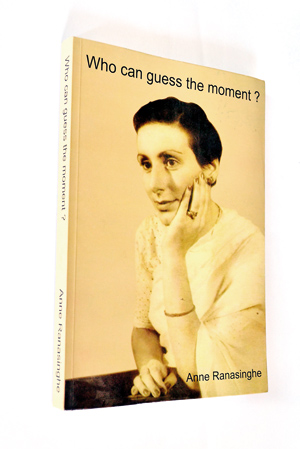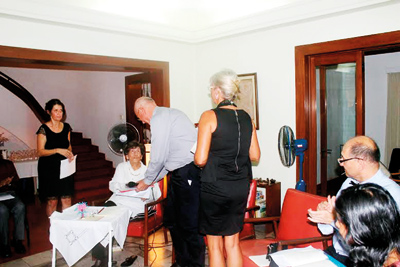A time for honour and reflection
On Tuesday last week Anne Ranasinghe received the Order of Merit of the Federal Republic of Germany, the highest tribute the nation can pay to individuals.

Anne Ranasinghe as seen on the cover of her latest book, ‘Who can guess the moment?’
An ornate red cross was pinned to her white blouse as the poet sat surrounded by a small circle of friends and admirers in her home on Rosmead Place.
The quiet elegance and intimacy of this gathering was an inspired choice, allowing the poet to both celebrate the honour while also acknowledging the painful history that had led up to this moment.
Addressing the gathering, German Ambassador Juergen Morhard said, “Seventy-seven years ago, in the April of 1938, the persecution of Jewish citizens in Germany started, visible to everybody in the world.”
He went on to describe the long and rich traditions that had characterised the community in the years before and how, “as if made of glass, it lay broken in 1945, broken like the windows of the synagogues.”
Mourning the loss to their country, the Ambassador said: “We cannot fully reconstruct this picture, we can only collect the shards that remain as a faint reflection of what was and what is lost.”
Anne in her poetry, fiction and non-fiction has unflinchingly grappled with her own painful memories of the Holocaust, and how it claimed her family.
Living in Sri Lanka, she has been a strong advocate for plurality, for human rights and for respect and acceptance between the island’s many communities.
Acknowledging this writer and poet’s influential place in the arts today, Ambassador Morhard concluded by noting: “The future needs remembrance and remembrance helps us build better societies.”
He emphasised that it is often left to the artists and the writers to reveal truths and preserve memories.”
Sitting by his side, Anne was clearly moved, saying in a gentle voice, “Thank you very much, it is very beautiful,” as the Ambassador lifted the cross out of its box and handed it to her.
When it was her turn to speak, she began by explaining why this ceremony marked “a new and rather awesome experience” for her.

Poignant moment: German Ambassador Juergen Morhard presents the Order of Merit to Anne at her home in Colombo
The home where she and her husband the late Professor D. A. Ranasinghe raised their seven children, has seen both happy and unhappy times over the 60 odd years they have lived here. But she is still amazed to now see it witness this honour bestowed upon her.
Describing it as an “unexpected, unbelievable, unreal gift,”the poet, confessed as well that she continued to ponder her eligibility.
She chose also to speak of her family: “My father, who was 52 years old when he died, and my mother at 42, was younger than her grandsons and daughters, and certainly than her only daughter: myself at 90.” She spoke lovingly too of her grandmother Marianne and of Züschen where seven generations of her father’s family lie buried.
“Oma Marianne had a garden full of bushes with ripening raspberries, gooseberries and loganberries, and both apple and pear trees and the plum trees carrying zwetchen, sweet plums to be baked with sugar and topped with cream,” she remembered.
With deliberateness, Anne chose that evening to recall her childhood in Germany only with tenderness, recreating for the audience all the pleasures of playing in the castle Schlodd Gravenburg (a “fairy-tale landscape”)and winter days when she would drag her father’s old toboggan to a hill to race down through “the snow covered, slightly hazardly curved roads of the little mountains.”
As her speech drew to a close, Anne spoke of the last time she saw her father: “I was just 13 when I left Germany with my kinder–ausweis [an ID card issued to children], a snowy day, early morning walking with my father to the station.
He was allowed to accompany me to the Dutch border. After that I was alone.”
Anne would return to her loss again and again in her work, and her personal struggle would resonate with readers across the world.
Her willingness to confront the painful past, to honour the memories of those long gone, and her commitment to a life fully lived were on display in the selection of poems read that evening.
Friends and family stepped forward to recite some of her best known pieces like ‘Holocaust 1944’, ‘Arrival and Departure’ and ‘Four things.’
Her son Nihal Ranasinghe delivered ‘An unemotional departure,’ and daughter Kushlani Amarasuriya read ‘Another year.’
The recitations were punctuated with beautiful performances of classical compositions – Nocturne No. 20 in C Sharp Minor, Andante from the Sonata in C Major and selections from the Magic Flute.
Anne found room for joy and humour in this occasion, even as she acknowledged the painfulness of her bereavement without bitterness, saying only with deep gratitude that she has come a full circle.
“I am 90 now. I have always lived a full life, always worked at something and always loved doing it.”
Putting away her speech, she ended: “I was born in Germany, was saved by England and lived a very fulfilled adult life in Sri Lanka. I belong now, I guess, to all three.”


